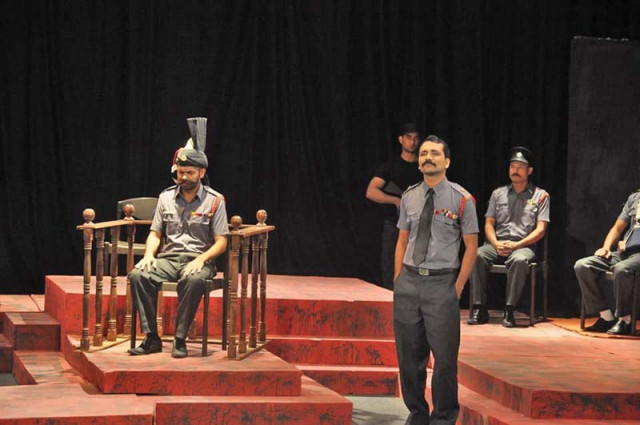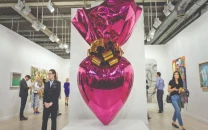So close yet so far
We take a look at how things have changed for theatre artists, 10 years since the inception of NAPA

A major problem that almost all students of the theatre program face is that of landing their first job. PHOTOS: PUBLICITY
One of the most recurrent questions to appear in high school yearbooks is, ‘Where do you see yourselves in 10 years?’ As straightforward and uncomplicated this query may seem to any student enrolled in a usual undergraduate programme (such as BBA or engineering), the same probe will become a source of musing for the apprentice currently training to become an actor.

With the latest batch of the National Academy of Performing Arts’ (Napa) theatre program recently graduating, now would be an appropriate time to solicit the question to some of the students and alumni of the institute. Having celebrated their 10 year anniversary alumnus of the first and the eighth batch of Napa, The Express Tribune looks into how the situation has improved for thespians. Despite all the progress that has been made throughout the years, things are still not optimal yet.
A graduate of the first batch of Napa and a current faculty member at the academy, Akbar Islam, recalled how hard-hitting it was for them as theatre artists even before they graduated from the institution. “When we started out, there was a lack of inspiration as we didn’t have anyone to look up to. Above all, we had the responsibility of creating an audience as theatre-going culture was virtually dead before we started doing it again,” asserted Islam.

Zia Mohyeddin has been serving as the president of Napa since 2005.
A major problem that almost all students of the theatre programme faced back then and continue to counter to date is that of landing their first job. According to Paras Masroor, a self-professed ‘freelance actor’, it all boils down to the lack of a proper theatre culture in the country and how despite the presence of (a handful of) theatre troupes in the country; theatre is not something that may guarantee actors financial security.
Masroor believes this is one reason why several graduates of the institute have gone onto change professions and entered filmmaking and television production. “You will see many Napa graduates enter other disciplines such as production, assistant direction and filmmaking — this is because at the end of the day, theatre in Pakistan is not as lucrative as other professions,” stated Masroor.
He added, “Because of their education and training, many of them are already well-trained in regards to different aspects of production like set design, casting, managing actors so they find it easy to adjust into this line of work.” On the other hand, Zain Ahmed, the artistic director of Napa Repertory Theatre, believes that things have improved drastically for aspiring theatre artists. He stated how they have been unable to cast one of their own graduates at a bargain price in their own productions as he is (rightfully) quoting a high fee.
“The main problem is that there are only five theatre troupes. We need to have about 50 to ensure that we are able to sustain everybody’s needs,” notes Ahmed.

Naila Jaffri and Rahat Kazmi
However Ahmed believes that Napa has played a key role in reviving cultural and art spaces such as Arts Council. “I remember the first time I went to the Arts Council auditorium and it had literally bats flying around. We helped restore that place by doing regular theatre and then came a time when we were unable to book it for our plays.”
Regardless of all the shortcomings and the lack of opportunities in the current market, the younger lot is still keen on sticking to the stage and not abandoning it in favour of film or television. “Obviously, I want to stay associated with theatre and don’t want to leave it but, during this time, I am also looking to put myself out there by auditioning for roles in films and television,” remarks Haris Khan, a graduate of Napa’s eighth batch.
He also spoke of how an institute such as Napa should work on building strong student-industry relationships so their graduates are able to secure better projects in film, television and theatre. “Most of the good quality parts nowadays are being given to the urban elite with no prior acting experience just because they are good looking. Whereas we, the trained actors, are being made to wait,” exclaims Khan.
But as Islam rightly points out during his conversation that gradually, ‘maahol ban raha hai’ [things are getting better] for stage artists, and if not them, then the coming generations of theatre actors will surely reap the fruits of their labour.
Published in The Express Tribune, April 27th, 2015.
Like Life & Style on Facebook, follow @ETLifeandStyle on Twitter for the latest in fashion, gossip and entertainment.



















COMMENTS
Comments are moderated and generally will be posted if they are on-topic and not abusive.
For more information, please see our Comments FAQ